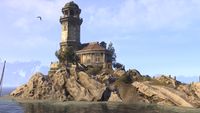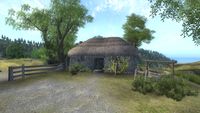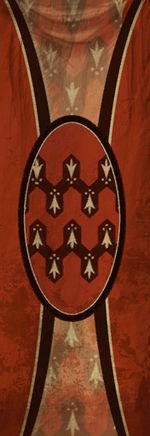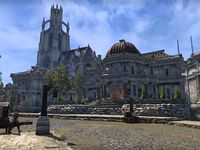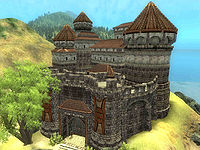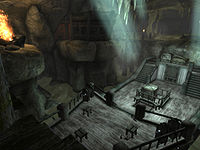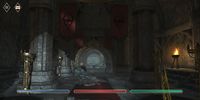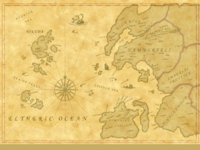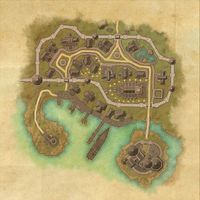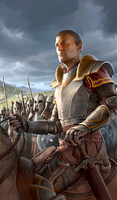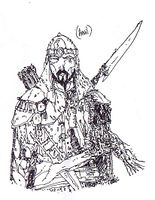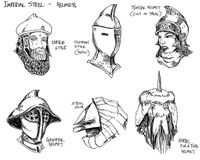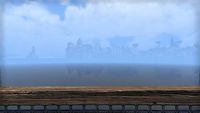Lore:Anvil
| Anvil | |
|---|---|
| Type | Settlement |
| Continent | Tamriel |
| Province | Cyrodiil |
| Region | Gold Coast |
| Appears in | Oblivion, ESO, Blades |

Anvil is a prosperous Colovian harbor city on the Gold Coast by the Abecean Sea at the very southwest end of Cyrodiil. It is the seat of County Anvil and it is located at the end of the Gold Road, west of Skingrad and Kvatch.
Geography[edit]
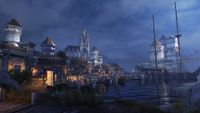
Anvil consists of five districts: Castle Anvil, Chapelgate, Westgate, Guildgate and Harborside.[1] The Redguards have had a notable influence on local architecture, which is of a similar style to that of nearby Hammerfell.[2] The city's graveyard is located across the street from the Chapel of Dibella. North of the graveyard lies Benirus Manor, one of Anvil's many stately manors. The city also houses chapters of the Fighters Guild and Mages Guild, the latter of which specializes in Restoration.[3]
Anvil's lighthouse has a history intertwined with the Dark Brotherhood, having served as a center of recruitment for the Dark Brotherhood in 2E 582[4] and as the base of operations for deranged Black Hand member Mathieu Bellamont in 3E 433.[5]
A large statue of a mermaid can be found in Guildgate district. With no inscription decorating its base and no certificate of origin stored in the city records, the statue remains a blank canvas upon which locals and visitors alike have painted their own picture. Its known commonly as the Brine Maiden, the Leggy Lass, the Salty Serenader, the Stone Seductress or Selkie of West Skerry.[6][7] Legends surrounding its origins are numerous but archaeological studies indicate that it pre-dates any structure in Anvil, suggesting that the city was possibly built around her.[6]
County Anvil[edit]
County Anvil is a region centered around the eponymous city in western Cyrodiil and is ruled by the Count of Anvil. Like other counties in the province, its size is comparable to the holds in Skyrim,[8] but their borders have yet to be explicitly defined on any map. The southwestern coast of Cyrodiil, between Anvil Bay and the western half of the Strid River near Dasek Moor, south of the Gold Road is confirmed part of the county.[9] Some notable locations in this area include the Enclave of the Hourglass, Garlas Agea, and Tribune's Folly.[9][10]
In the hills outside of Anvil are streams with white poplar trees growing around them.[11]:Part 1, Chapter 8 Locals consider County Anvil to be premium hunting ground. Anything from bears, boars, deers, mountain lions, and wolves can be found in just the right places.[12]
History[edit]
First Era[edit]
Anvil has existed since at least the early years of the First Empire, where it enjoyed a rich statuary tradition. Ancient statues from this time period were made from the same material as the Mermaid of Anvil, and one bust likely depicts the regency council lords in nearby Kvatch, suggesting a link between the two. Artistic expression of such statues was later suppressed when the Alessian Order rose to power.[13] In 1E 2200, King Bendu Olo ruled the city and led the All Flags Navy against the Sload of Thras.[14] Originally, Anvil was a small collection of ramshackle huts infamous for being a violent haven for pirates, refugees, thieves, thugs, "and any other men and women of ill intent who happened to wash up in Anvil Bay".[15] When Bendu Olo returned after vanquishing the Sload, he began converting what was then known as Anvil Fortress into Anvil Castle.[16]
Second Era[edit]
Having declared itself a free city following the fall of the Second Empire,[16] Anvil functioned as an important port, attracting merchants, smugglers, and raiders from all across Tamriel and as far south as Pyandonea. The Longhouse Emperor Leovic and his court visited Anvil four times during his reign, but he was disliked by the city's citizens and never returned after the infamous "Anvil Commotion" of Mid-Year 2E 569.[16] In 2E 577, Fortunata ap Dugal, leader of the Red Sails pirates, captured the city, installed herself as governor, and declared dominion over the entire Gold Coast. This put Anvil in conflict with nearby Kvatch, which remained loyal to the Empire.[4] The city was not directly involved in the Alliance War which later raged in the Heartlands of Cyrodiil, benefiting from the rough stone wall originally built during Varen's Rebellion to protect the Gold Coast from retaliation by the Longhouse Emperors.[4] In 2E 582, Anvil was threatened by werewolves from the nearby hills, and was subjected to a brief undead attack when Zombies rose from the harbor later that year.[17] Concurrently, many innocent citizens of Anvil also were killed as the Dark Brotherhood used the city as the epicenter of their recruitment drive.[4]
Third Era[edit]
By the time of the Camoran Usurper, the city had been reduced to a collection of ramshackle huts housing criminals and refugees, and Castle Anvil was no more. The town was controlled by the Red Sabre pirates, but it was taken over and used as a base of operations by Commodore Fasil Umbranox while he attempted to break up the fleet circa 3E 267. During the battle in Anvil Bay between Umbranox and Torradan ap Dugal, the town was set alight.[18] Dugal tried to flee, but Umbranox's battlemages caused a rocky outcropping to collapse over his ship, the Black Flag. As a reward for destroying the pirates, Umbranox was given the title of Count of Anvil, as well as the funds to build a city over the ashes of Old Anvil. He built a new Castle Anvil on the same island the Black Flag was buried under.[15] Umbranox's descendants would rule for centuries afterwards.
In 3E 335, the Souls of Anvil's recently deceased became victim to Lorgren Benirus, a wealthy Imperial who sought to prolong his own life by becoming a Lich and destroying the city.[19] A mob led by the local Mages Guild attacked Benirus Manor before he could complete his ritual, but the manor remained cursed by the spirits of the dead and was allowed to fall into ruin. Circa 3E 422, Count Corvus Umbranox of Anvil went missing after becoming the head of the Thieves Guild and inheriting Nocturnal's curse by donning the Gray Cowl. His wife, Millona Umbranox, would rule in his stead for the next eleven years, and was beloved by her people.[20]
In 3E 433, several disasters struck Anvil. The city was briefly besieged by an Oblivion Gate to the Deadlands during the Oblivion Crisis,[21] the city's men were targeted by a group of female thieves,[22] and the entire crew of a ship was murdered in port by a crazed member of the Dark Brotherhood.[23] The priestesses at the Great Chapel of Dibella were also murdered and the chapel desecrated by Aurorans under the command of Umaril the Unfeathered, who had returned to Tamriel to bring down the Nine Divines.[24] However, the curse was also lifted from Benirus Manor,[25] and the undead crew of the Black Flag were put to rest after the cavern of "Dunbarrow Cove" was excavated beneath Castle Anvil.[26] Corvus Umbranox mysteriously returned to court that year and resumed his duties as count, after he used the power of an Elder Scroll to alter history and destroy the Daedric curse.[27]
Fourth Era[edit]
During the Great War, the city was put under siege by the armies of the Aldmeri Dominion, which ended with a Dominion victory in 4E 172.[28] Circa 4E 180, Anvil Keep was a ruined structure inhabited by monsters, although it is unknown what connection these ruins have to the city.[29] Later in the Fourth Era, the Crimson Dirks raided warehouses holding enchanted swords from Anvil. On the 22nd of Morning Star, 4E 201, Daynas Valen arrived in the city, fleeing prosecution after killing a collector in Bravil. He boarded the Icerunner, a ship bound for Solitude, from the city's docks.[30]
Known Rulers[edit]
- First Era
- King Bendu Olo (before 1E 2241 - 1E?)
- Second Era
- Count Ephrem Benirus (ca. 2E 566 - 2E 577)[31]
- Provincial Governor Fortunata ap Dugal (2E 577 - 2E 582)[32]
- Third Era
- Count Fasil Umbranox (ca. 3E 271)[18]
- Count Corvus Umbranox (ca. 3E 422 / 3E 433)
- Countess Millona Umbranox (3E 422 - 3E 433)
Gallery[edit]
-
Anvil circa 2E 582
-
Anvil Castle circa 3E 433
-
The mermaid statue
-
Anvil Keep circa 4E 180
-
Map of Anvil circa 2E 582
-
Anvil circa 2E 582, as seen from the deck of The Flensing Beak
See Also[edit]
- For game-specific information, see the Oblivion and Elder Scrolls Online
 articles.
articles.
Books[edit]
- Guide to Anvil by Alessia Ottus — An overview of Anvil's people and notable places
References[edit]
- ^ Guide to Anvil — Alessia Ottus
- ^ Wilbur's dialogue in Oblivion
- ^ Mages Guild Charter
- ^ a b c d Events of ESO
- ^ Mathieu Bellamont in Oblivion
- ^ a b The Mysterious Mermaid of Anvil
- ^ The Elder Scrolls IV: Oblivion Game Guide
- ^ The Holds of Skyrim
- ^ a b Map of Cyrodiil – The Elder Scrolls IV: Oblivion
- ^ Gold Coast in ESO: Dark Brotherhood
- ^ Lord of Souls — Greg Keyes
- ^ Pinarus Inventius' dialogue in Oblivion
- ^ Water-worn Anvil Bust antiquity codex entries in ESO: Greymoor
- ^ Pocket Guide to the Empire, 1st Edition: The Wild Regions — Imperial Geographical Society, 2E 864
- ^ a b Original obliviondownloads.com download description
- ^ a b c Loremaster's Episode of ESO-RP ZOS Interview
- ^ Madam Firilanya's messages in ESO
- ^ a b Cap'n Dugal's Journal — Torradan ap Dugal
- ^ Scrap from Lorgren's Diary — Lorgren Benirus
- ^ Loading screen in Oblivion
- ^ Oblivion Gate outside of Anvil in Oblivion
- ^ The Siren's Deception quest in Oblivion
- ^ Traitor's Diary — Mathieu Bellamont
- ^ Oblivion: Knights of the Nine
- ^ Where Spirits Have Lease quest in Oblivion
- ^ Dunbarrow Cove quest in Oblivion: Thieves Den official download
- ^ The Ultimate Heist quest in Oblivion
- ^ The Great War — Legate Justianus Quintius
- ^ Anvil Keep in Blades
- ^ Daynas Valen's Journal — Daynas Valen
- ^ Gold Coast Guide, Part Two — Astinia Isauricus
- ^ Pirate Queen of the Gold Coast — Midara Salviticus, Historian, University of Gwylim
Note: The following references are considered to be unofficial sources. They are included to round off this article and may not be authoritative or conclusive.
